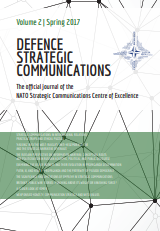‘HACKING’ INTO THE WEST: RUSSIA’S ‘ANTI-HEGEMONIC’ DRIVE AND THE STRATEGIC NARRATIVE OFFENSIVE
‘HACKING’ INTO THE WEST: RUSSIA’S ‘ANTI-HEGEMONIC’ DRIVE AND THE STRATEGIC NARRATIVE OFFENSIVE
Author(s): James Rogers, Andriy TyushkaSubject(s): Politics, Media studies, Geography, Regional studies, Communication studies, International relations/trade, Security and defense, ICT Information and Communications Technologies, Peace and Conflict Studies
Published by: NATO Strategic Communications Centre of Excellence
Keywords: Russia; Western ‘equivalential chain’; Ukraine; strategic narrative offensive; anti-hegemony; spoiler politics;
Summary/Abstract: Contrary to the narrative in much of politics and academia, Russia’s alienation from the West did not start in 2014—it is a lasting and inherent phenomenon. Since the mid-1990s, Moscow’s attempts to ‘capture’ the narrative of Europe or even portray itself later on as a ‘better Europe’, transcended in 2014 into a more overt and antithetical approach of strategically juxtaposing Russia versus Europe, or placing ‘Russia being not (declinist and decadent) Europe’, a part of the likewise allegedly declining ‘West’. Russia’s appeal for European ‘self-denial’ does not only find its supporters in Europe, predominantly populist and radical parties, but also contributes to a more general frustration among Europeans regarding their own self-perception, as well provokes Western ambiguity and uncertainty about its responsibility for regional security affairs, particularly in the European neighbourhood. This article argues that, by destabilising the immediate vicinity and regional security order, the Russian leadership does not pursue a policy of balancing the Western hegemonic formation, thus strategising a positive competing (counter-hegemonic) framework. Rather, it engages in an anti-hegemonic strategy through a deeply negative spoiler offensive. The article conceptualises Russia’s anti-hegemonic drive as a three-pronged strategic narrative offensive that operationally seeks to 1) ‘desynchronise’ political developments in the European Neighbourhood to ‘distort’ European perceptions of reality; 2) ‘de-articulate’ the West, i.e., splitting the Atlantic democracies from the European mainland; and 3) ‘saturate’ the vacuum with false and fictitious narratives, to sow confusion and maintain manageable disorder.
Journal: Defence Strategic Communications
- Issue Year: 2/2017
- Issue No: 2
- Page Range: 35-60
- Page Count: 26
- Language: English

